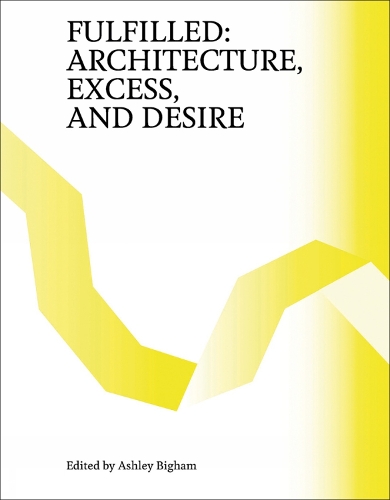
Fulfilled: Architecture, Excess, and Desire
(Paperback)
Publishing Details
Fulfilled: Architecture, Excess, and Desire
By (Author) Ashley Bigham
Oro Editions
Oro Editions
7th November 2022
United States
Classifications
Professional and Scholarly
Non Fiction
Distribution and logistics management
Psychology
720.922
Physical Properties
Paperback
180
Width 177mm, Height 228mm
506g
Description
Based on the eponymous symposium and exhibition, Fulfilled: Architecture, Excess, and Desire considers the role of architecture in a culture shaped by the excessive manufacturing and assuagement of desire.
Until the term became synonymous with Amazon warehouses, the concept of fulfillment described the achievement of a desiresometimes tangible, often psychological or spiritual. With the rapid growth of e-commerce, our understanding of fulfillment has evolved to reflect a seemingly endless cycle of desire and gratificationone whose continuity hinges on our willingness to overlook the cultural, economic, and environmental impacts of our ever-increasing expectation of quick and efficient fulfillment. A closer look at fulfillment reveals a social, typological, formal, aesthetic, and economic practice constructed collectively through both digital and physical interactions. It is a cultural practice which evolves like a language, both universally transferable and contextually specific. As a symposium, exhibition, and now publication, this project aims to draw out these new arrangements, sticky relationships, and material byproducts of cultural production and to ask again the age-old question, What does it mean to be fulfilled
This book examines the architecture of fulfillment through three lenses: logistical, material, and cultural fulfillment. Each reveals the new forms of architectural practice and research that are possible, typical, and even surreptitiously encouraged in the age of Amazon. Fulfillment networks are not invisible systems; they are tangible objectswarehouses, suburban houses, parking lots, cardboard boxes, shopping malls, mechanical systems, shipping containerswith which architects necessarily interact. From political mapping and questions of labor to digital and physical storage typologies, contemporary architects learn from and work critically within the architecture of fulfillment. Their interests and approaches include the material and environmental shortcomings of global logistics and the formal, representational, and cultural potentials of a culture of excess. This book highlights architectures unique capacity to offer methodologies for confronting an increasingly ambiguous, alienating world and produce new knowledge and unexpected solutions that go beyond the dichotomies of rural and urban territories.
Author Bio
Ashley Bigham is an assistant professor of Architecture at the Knowlton School of Architecture and co-director of Outpost Office. She is a former Walter B. Sanders Fellow at the University of Michigans Taubman College, a MacDowell Fellow, and a Fulbright Research Fellow in Lviv, Ukraine.
